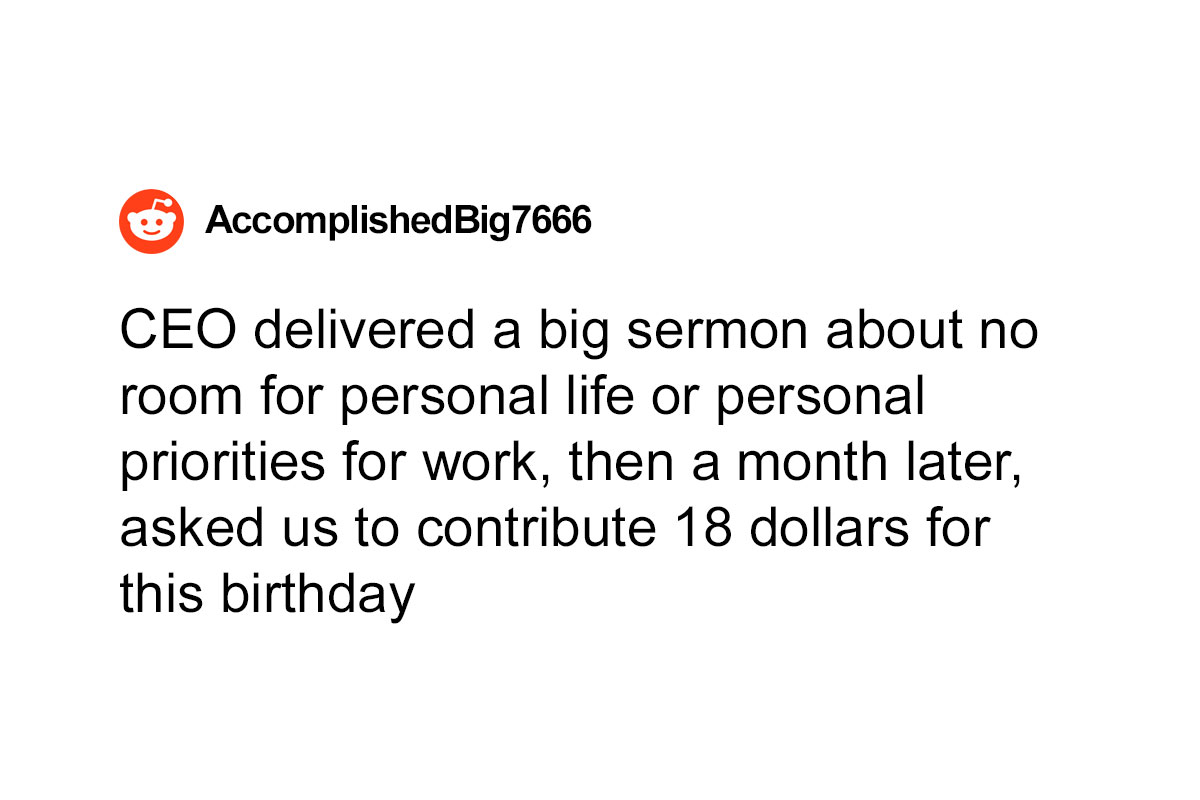
CEO Tells Employees There’s No Room For Their Personal Lives At Work, Then Asks Them To Each Contribute $18 For His Birthday
Interview With Author“Rules for thee and not for me” seems to be a philosophy some higher-ups have internalized to such an extent that they will contradict themselves multiple times a day. Entitled bosses are, unfortunately, not anything new, but these days communities around the internet can at least operate as a place to share and vent the worst cases.
One man described a particular CEO who believed that employees, body and mind, were on the clock at all times, as they lectured them on priorities. Then, in a move that wouldn’t surprise any experienced worker, they turned around and started asking people for birthday money contributions. We got in touch with AccomplishedBig7666 to find out more.
Entitled bosses are quite common and often drive workers away
Image credits: Karolina Grabowska (not the actual photo)
One worker shared his experience with a CEO that demanded that work be the number one priority, then started to make birthday requests
Image credits: Karolina Grabowska (not the actual photo)
Image credits: AccomplishedBig7666
Toxic managers sink productivity through bad rules
Bored Panda got in touch with AccomplishedBig7666 and they were kind enough to answer some questions. We wanted to know if there were other examples of how the company created frustrating requirements for workers. “The management was micromanagement they deducted salary even if you are 10 minutes late. If you are 1 minute later every day, the time would add up and it would be 30 minutes salary deduction at the end of the month. The salary deductions were a lot and they hurt. They had five checkouts too. Basically, the CEO believed in a very strict employee culture whereas he himself was quite luxuriant, but considered himself a hard worker, and genuinely believed that he had earned everything. The work/life balance was flawed and non-existent. Zero focus was on performance.”
He did leave us with this thought, however: “Even though I made the post in frustration and it wasn’t a lie, the CEO wasn’t as bad as the post made him. I mean he did care for employees but in a way that someone cares for their pets. Like we would feed them but not ask them to sit with us on the sofa or share the dining table. We often received charities which was odd…and he threw a lot of money on projects. He was an ambitious person and not a bad person at all. just someone with a flawed perception of employees. He was ex-military so you can guess.”
Image credits: Andrea Piacquadio (not the actual photo)
Some companies create policies that destroy work-life balance
Unfortunately, many US workers are in a similar predicament, where they are managed by people who think employees can and need to be on call at all times. While this isn’t exclusive to the US, certain nations actually have laws prohibiting managers from communicating with employees outside of working hours. France, for example, stipulates that employees can not be required to view workplace communications after working hours. So managers and bosses can send whatever they want to, but workers can not be asked to view it or penalized for not viewing it. Other states in the EU have a similar “right to disconnect,” which prevents managers from making the sort of demands that OP’s ex-boss did. Nevertheless, these laws only exist because managers everywhere would no doubt like to ensure that workers are thinking about work at all times of the day.
Some companies try to go even further by making it very difficult for employees to get any sort of time off. In the US, for example, one-third of employees have no paid time off in their employment contracts and even if one is on “vacation,” many report still doing some work due to managerial pressure and tight deadlines. While some people thrive under unceasing pressure, in most cases people burn out or simply quit. Either way, the human costs are absurd when we consider that this is all to fill the pocket of a CEO. Some might say that a business exists to generate a profit and while this is true, burnt-out, unmotivated employees are anthea to a healthy, successful business. The costs of finding, hiring, and training a worker are often higher than any raise they might be asking for, or the “loss” of productivity caused by them “only” working their hours.
Image credits: Karolina Grabowska (not the actual photo)
Leaders sometimes are incapable of realizing how much damage they are doing to their own organization
Replacing a worker, like OP, generally costs roughly a third of the salary of an empty position as well as the general loss of productivity caused by an empty role at a company. There is also a larger, more intangible cost, as a lot of turnover indicates poor working conditions. As common sense as it might be, many leaders do not seem to have internalized that employee satisfaction has a direct effect on employee productivity. OP quit, but likely many other workers soldiered on, unmotivated, stressed, and tired until they themselves jumped ship. This means that a “work-oriented” company is actually spending a lot of its time just finding new employees, and getting them up to speed, all while driving out more experienced workers. Sometimes this is explained by managerial incentives, where cutting costs leads to benefits for the manager, at the cost of the company. But the CEO having this sort of mindset is deeply misguided.
This creates the strange, but all-too-common paradox where the people at the top make the worst decisions, despite the perception that they have more knowledge and experience. Unfortunately, there does seem to be a connection between the traits that cause someone to be a leader and an inflated perception of themselves. Many leaders will think they have achieved their position and role by simply being intrinsically better than others. This means they often underestimate how often they fail and make mistakes, which creates a feedback loop. The result, for example, is a deeply arrogant CEO, like in OP’s story, who ends up being the main reason people quit. As much as they can “preach” about productivity, they are no doubt one of the main contributors to their own workers leaving.
Image credits: Andrea Piacquadio (not the actual photo)
Readers were shocked by how downright malicious this CEO acted
Others shared similar stories
Your ceo wanted a kickback from your salary. That’s what this and other mandatory contributions for gifts to management are.
One hundred percent this. It is also illegal by the law in most states.
Load More Replies...@CIKLOP 420 - at least a clown has a net benefit to society. Please share something that Trump has done that has benefitted society. @Disinforminationalisticalities - get over yourself and that high horse you rode in on, not everyone needs political masters to tell them what to think.
Load More Replies...I would have gone to the party dressed as Death and just been standing in the corner the whole time. Gotten everyone else in on the joke and they wouldn't acknowledge me. When this dipshit would finally snap and run over and start screaming, I'd just say, "Another year closer," and snigger as I'd walk out. Again, I would get the joke in with everyone else and they wouldn't acknowledge me at all. It would have been hilarious.
Your ceo wanted a kickback from your salary. That’s what this and other mandatory contributions for gifts to management are.
One hundred percent this. It is also illegal by the law in most states.
Load More Replies...@CIKLOP 420 - at least a clown has a net benefit to society. Please share something that Trump has done that has benefitted society. @Disinforminationalisticalities - get over yourself and that high horse you rode in on, not everyone needs political masters to tell them what to think.
Load More Replies...I would have gone to the party dressed as Death and just been standing in the corner the whole time. Gotten everyone else in on the joke and they wouldn't acknowledge me. When this dipshit would finally snap and run over and start screaming, I'd just say, "Another year closer," and snigger as I'd walk out. Again, I would get the joke in with everyone else and they wouldn't acknowledge me at all. It would have been hilarious.

 Dark Mode
Dark Mode 

 No fees, cancel anytime
No fees, cancel anytime 



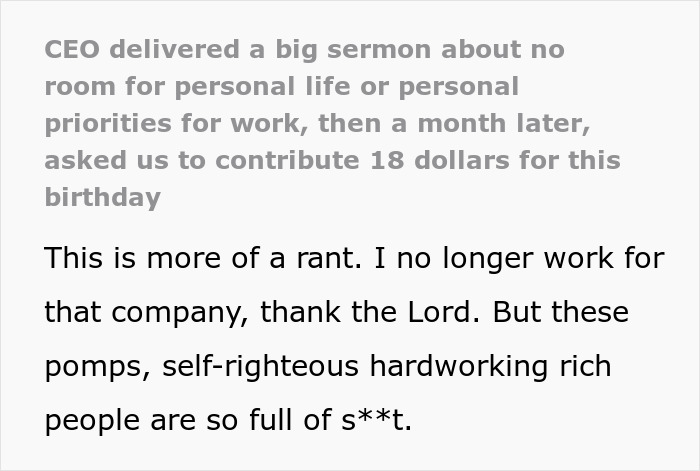

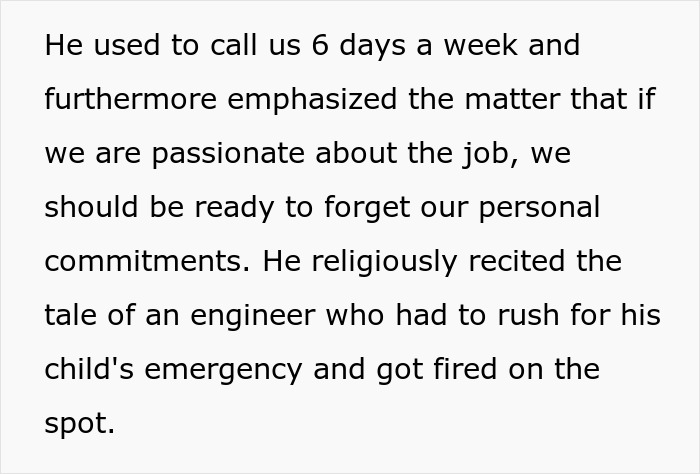
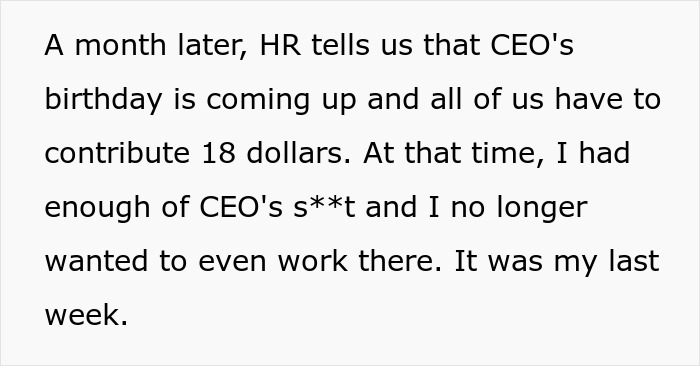

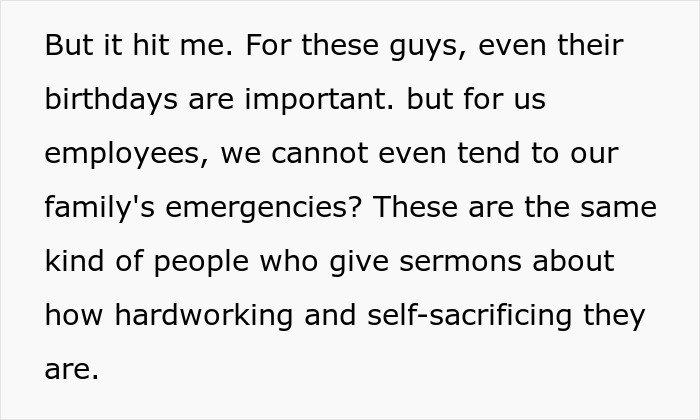

















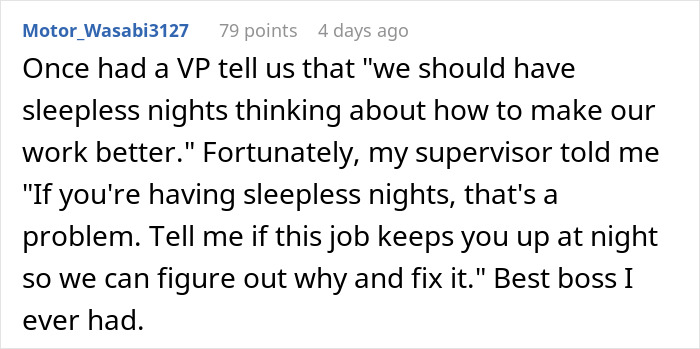
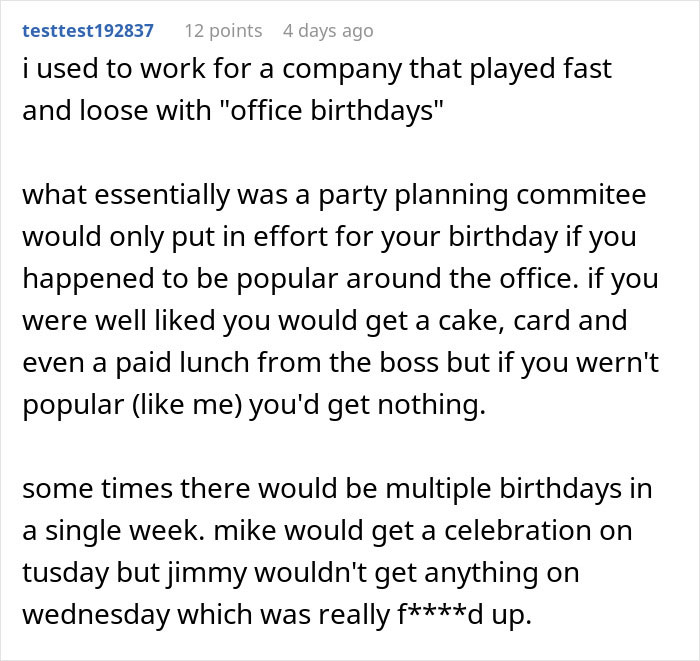

























48
34